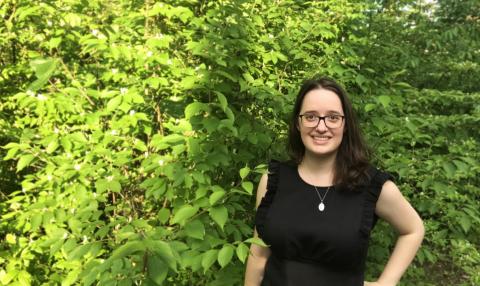"Architecture must be conscious of and sensitive to the resources used to minimize its impact on the built environment."

Anna Goodman
- Degree: Master of Architecture
- Grad year: 2020
- Program:
- Campus: Vancouver
Anna Goodman graduated this year with a Master’s in Architecture from the University of British Columbia. She previously attained a Bachelor’s of Science in Architecture from Ball State University in 2018. She was an active member of the School of Architecture and Landscape Architecture (SALA), holding the position of Communications Coordinator with the organization For A Feminist Architecture (FaFa). Anna also worked as a Work-Learn student in the fabrication workshop as a laser technician, and as a Graduate Academic Assistant for the Learning Education Fund (TLEF) at SALA. She has a passion for design and a keen interest in disaster response, emergency planning and United States policies.
Why did you choose to go into your field of study at UBC?
I chose to study at the University of British Columbia for my master’s because UBC places an emphasis on both cultural and environmental sustainability, which I believe are critical to the future of architecture. Poorly conceived architecture can have a detrimental impact on the natural environment, consuming vast quantities of resources in both construction and operation. Architecture must be conscious of and sensitive to the resources used to minimize its impact on the built environment. Without sustainable architecture, we cannot maintain our rate of growth in the built environment, and I believe sustainability is a vital field moving forward. However, at the same time, architecture does not exist in isolation; it has a profound, lasting impact on communities and people. I believe that architecture must be sensitive to current and past heritage as a matter of ethics. The University of British Columbia values this as well.
What has made your time at UBC memorable?
The School of Architecture at UBC emphasizes the social aspects of studio culture in a way that really engaged me in the architectural process. The school allowed me to explore a variety of ideas and interrogations placing me in contrast with other thinking processes.
What has been your most valuable non-academic experience studying at UBC?
My involvement as Communications Coordinator with the organization For A Feminist Architecture (FaFa) has allowed me to challenge pre-existing bias and stereotypes within the field of architecture. With FaFa I was able to participate in discussions, discourse and activism to help educate and advocate students at SALA.
Tell us about your experience in your program. What have you learned that is most valuable?
The thesis program in SALA allowed me to explore independent interests and research in a profound way. I was able to tailor my education to focus on subject areas that most interest me in my future career. This process is new to me, and it allowed me to gain experience in both designing and carrying out my own projects.
How are you applying the skills you learned through your studies at UBC?
At the moment, I am starting my career working as a graduate architect in the United States. In the future, I hope to continue my education to expand on the interests I explored in my thesis. I want to eventually work for an organization like the Federal Emergency Management Agency (FEMA).
What advice would you give a student entering your degree program?
I would tell students to use the framework of their degree not as a means to an end but as a way to explore what they are passionate about.
How do you feel your degree has benefitted you compared to a different field of study?
Architecture students are trained to be generalists - we learn about a wide variety of issues and subjects in order to comprehensively manage all aspects of projects in our professional careers. I feel that this degree benefits me as it teaches me both technical and graphic skills that can be applied to a variety of positions in the future.
Where do you find your inspiration?
My family and friends have been incredibly supportive throughout this process. The social aspect of the studio culture allows me to closely interact with and seek advice from my classmates, which has made me a better designer.
What are your immediate and/or long-term plans for the future?
Currently, I am working as a graduate architect in the United States. In a couple of years, I hope to continue my education by pursuing a second Master’s in Emergency or Risk Management, eventually working for an agency like FEMA to work on disaster response issues.
What are your future plans to make a difference in our world?
I feel that climate change (as well as the issues being raised during this pandemic) are going to be critical issues to resolve in the future. I hope that in my future career I would be able to address these problems in a more meaningful way.